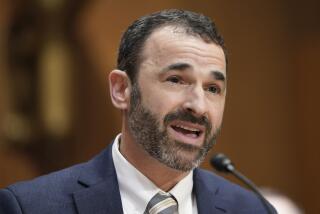Tax Rules Target Abusive Shelters
- Share via
The Treasury Department on Monday issued new rules and proposed some others as part of the federal government’s continuing crackdown on the use of abusive tax shelters to hide income.
The rules would boost penalties for taxpayers who fail to report certain transactions, impose higher standards on accountants and require additional disclosures about offshore entities owned by U.S. citizens -- moves designed to make it easier for the Internal Revenue Service to find and examine tax shelters that it believes improperly reduce income tax.
“Taken together, the actions we are announcing today represent another significant step to end the proliferation of abusive tax-avoidance transactions that have undermined confidence in our tax system,” said Assistant Treasury Secretary Pam Olson. “We continue to believe that sunshine is the best disinfectant for abusive transactions.”
The announcement comes on the heels of a report by the General Accounting Office on the effect of illegal tax schemes. Tax officials believe that only a small fraction of Americans cheat on their taxes -- fewer than 750,000 out of the more than 130 million individual taxpayers -- but that group accounts for billions in lost revenue, according to the GAO report.
The use of offshore tax shelters alone is believed to cost the government $20 billion to $40 billion annually in lost revenue. Other types of cheating, through illegal domestic trusts, schemes to get bogus refunds or simply not paying, are so varied and rapidly evolving that it’s impossible to estimate their cost, the GAO report said.
Two of the rules became final Monday and went into effect immediately, tax officials said. Two were proposed and will go into effect only after a public comment period and further review.
The final rules are largely technical, clarifying what types of transactions must be reported to the IRS and hiking the penalties for failing to disclose certain types of tax shelters. The IRS isn’t interested in common shelters such as home mortgage interest deductions but is focused on complicated transactions that the agency believes improperly reduce income tax.
The proposed rules also would make it more difficult for taxpayers to avoid heavy negligence and tax fraud penalties by leaning on so-called “opinion letters.” Opinion letters, typically provided by law firms and accountants to justify the use of complex tax shelters or other aggressive tax strategies, often are used to exonerate the taxpayer from facing penalties that can range from 20% to 75% of the underpaid tax, plus interest, said Elliott H. Kajan, partner at the Beverly Hills tax law firm of Kajan Mather & Barish.
Under the proposed rules, tax practitioners would be expected to warn their clients about the limitations of opinion letters and disclose whether they have vested interests in issuing the opinions. For example, practitioners sometimes get referral fees from shelter promoters.
In addition, the agency plans to require disclosure of more information on certain types of foreign entities that are owned by U.S. taxpayers but are disregarded for U.S. tax purposes. This is an area of the law that has been largely neglected, said Paul Sczudlo, partner at Loeb & Loeb in Los Angeles.
The IRS on Monday also named a new director of the Office of Professional Responsibility. Cono Namorato, formerly a partner in the Washington law firm of Caplin & Drysdale, will lead investigations of misconduct against tax practitioners and enforce standards of practice on those who represent tax clients before the IRS.
“The IRS is looking for greater transparency, and they are upping the ante for those who do participate in abusive transactions,” Sczudlo said. “They’re saying that they are not only increasing scrutiny; when they do find something, they are going to come down hard.”










